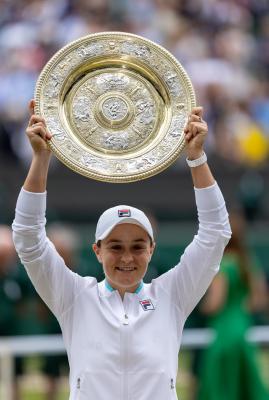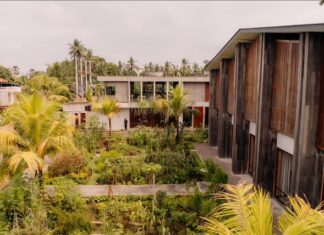Before Noosa-based tennis legend Evonne Goolagong Cawley won Wimbledon in 1971, she was inspired by a story in a Princess magazine about a girl who was taken to Wimbledon to play tennis and won.
“I used to pretend I was her,“ she said. “I used to dream about playing on that magical place.”
One of the last messages Evonne sent to Ash Barty before her Wimbledon win on Sunday was “dreams do come true”.
Both proud Aboriginal women Ash and Evonne share parallels in their tennis careers, each winning their first Grand Slam in the French Open, reaching the rank of world number one and winning Wimbledon 50 years apart.
Barty paid tribute to her tennis hero by donning a Fila dress inspired by Evonne’s on-court look that commemorated the anniversary of Evonne’s triumph in London in 1971.
“I hope I made Evonne proud,” Ash said in an emotional victory speech.
“I felt so incredibly proud of her and for the way she’s handled herself on and off the court,” Evonne said. “A great role model and a great friend. That can only help players of the future. They can watch her on and off the court.
“I was so chuffed when she wore that dress. I thought, ’wasn’t that lovely’. If it brought her luck – great.
“It’s just magical when you achieve that dream. I’m sure it’s magical for her too.”
Evonne said watching Ash win made her realise how excited her family was when she had won Wimbledon.
“It made me realise how happy I made my family. I understand what they went through – it was so emotional.
“Ash is like a little sister, a part of my family. I had a good feeling before she went on the court she was going to win.
“I’m just so proud of her. I even enjoyed watching her being celebrated after. It put me back to that time and brought back some wonderful memories.”
Evonne said Ash made her proud from the first time she and husband Roger saw her play at the Australian Open and knew she would be a champion.
“I knew from the first moment I saw her when she was about 13. She had everything.”
According to Fila, who sponsors Ash, she said: “It’s hard to put into words how much of an impact Evonne has had on the culture of tennis in Australia and on me personally, I don’t think there is anyone more iconic in our sport.
“I am very proud to wear this commemorative collection from Fila in celebration not only of her momentous victories on the court, but also her incredible legacy off of it.”
A member of the Wiradjuri people, Evonne grew up in the small country town of Barellan in NSW where her long hours spent hitting a tennis ball against a wall with a home-made racket were noticed and she was helped to play tennis where her skill was soon realised.
“I was very shy when I started school,“ she said. “I started playing tennis and it gave me the confidence to put my hand up and ask questions at school.“
The help she was given she passes on to others through the Evonne Goolagong Foundation which she and her husband Roger Cawley established about 20 years ago.
Each year the program sponsors about 1000 Indigenous children to play tennis along with maintaining their health and education.
With the program Evonne visits schools around the country, telling the kids about the dream she realised.
The dream also came true for Barty in her 6-3 6-7 (4-7) 6-3 victory over Czech Karolina Pliskova.
Her win came 10 years after she won the Wimbledon girls’ singles title at age 15.
Evonne said Ash would probably have a few sleepless nights as she celebrated her win but would soon have to prepare herself for the upcoming Olympic Games and US Open.
This week Evonne’s daughter, Kelly Cawley Loats, who was three years old when Evonne won her second Wimbledon in 1980, spoke about her inspirational mother.
“Being an Indigenous Australian in the spotlight, mum faced pressure to be political. Ultimately, this sport was her platform – and it gave her a special power. She has always had the capacity to bring people together, just by being who she is,” Kelly said.
“She’s such a positive person; she focuses on the impact she can make.
“As a player, mum was celebrated for her grace and elegance on court. But you don’t win as much as she did without steel inside. As a child, she was sent to live with her coach in Sydney. She cried every night – but not once did she call up her family to say, ’I want to come home’.
“And somehow, on her first visit to Europe in 1970, she managed to win Roland Garros and Wimbledon, back-to-back, when still only 19.”
Kelly said 50 years on the family loved watching Ash Barty win Wimbledon and enjoy the special bond between them.
Kelly praised her mother’s qualities of inner strength, her being in control that holds the family together while at the same time being gentle, kind, generous and modest.
“She treats folks the same, no matter who they are. If people are staring in public, she doesn’t look away – she goes up to them and makes a meaningful connection.
“It’s the same in more formal settings. She never prepares for her public speaking engagements – anywhere, ever. She has this gift of talking from her heart so effortlessly. It’s not contrived in any way, and people recognise that. That’s another reason people adore her. She’s a natural athlete – and a completely natural speaker.
“When I think about how much mum is loved by Australians from all walks of life and tennis fans around the world, “proud” doesn’t even begin to cut it.
“She’s an icon to so many, but she’s also the mother who played goalie for my girls’ soccer team in Noosa – body pads and all.
“She’s the wife who signed up for a pro-celebrity golf event with her husband, an avid golfer – and stole the show by hitting a hole in one.
“Mum taught my brother and me that whatever you are doing, you try to have a good time. She taught us that winning is a bonus – which I think is a pretty good lesson in life.”









